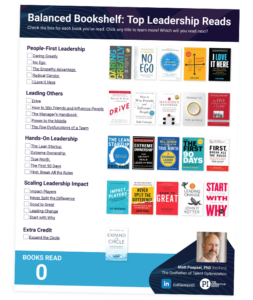It’s often said that “leaders are readers.” Leadership is a complex discipline, so this is great advice. If you want to feel confident and be recognized as a next-level leader, you simply have to study the craft. Once you’ve decided to channel your inner bookworm, however, you may wonder:
“What exactly should I be reading?”
Hundreds of new leadership books are written each year, so rather than focus on which books to read, I thought I’d share the types of books you may want to consider.
Timeless reads
Some business books are so remarkable that they have staying power. If you can tolerate a few dated examples and some archaic language, you’ll still find gems you can use in books that were penned decades ago. These books are heavily cited and widely read, so they can give you a common language with other leaders.
Dale Carnegie’s How to Win Friends and Influence People: Updated For the Next Generation of Leaders, for example, speaks to a specific subset of post-pandemic aspiring leaders, in a very practical sense.
New releases
Our world of work is constantly changing. Evolution of the economy, technology, and the workforce require us to keep current. Each year, a dozen or so excellent books help us stay sharp and relevant. Don’t judge a book by its cover, however. Big names and big marketing budgets don’t always produce worthwhile books.
The Empathy Advantage: Leading the Empowered Workforce, by Heather McGowan and Chris Shipley, approaches leadership through a modern, more enlightened lens.
Books with frameworks
If a picture says a thousand words, a simple-but-instructive framework must be worth ten thousand. Highly complex concepts can be transformed into relevant insights for your team or business all thanks to the help of a well-thought out diagram and accompanying applications.
Simon Sinek’s Start with Why: How Great Leaders Inspire Everyone to Take Action takes a fundamental question and applies it to everything from customer loyalty to civil rights, in an attempt to understand the power of personal influence.
How-to books
Sometimes, you want to roll up your sleeves and get to work. Many great leadership books include exercises, worksheets, and thought-provoking reflection questions. For those readers willing to do the work, greater self-awareness, improved goal setting, and effective action plans await.
Liz Wiseman dives into this sort of dirty work with Impact Players: How to Take the Lead, Play Bigger, and Multiply Your Impact.
Technical reads
Certain aspects of the leadership discipline are highly nuanced. If you’re interested in strategic planning, negotiation, leading agile software development teams, or global sales operations, you’ll likely need a very specialized read. Don’t expect to sail through these titles, but commit to deep learning.
Eric Ries provides definitions and a scientific approach for growth at scale in The Lean Startup: How Today’s Entrepreneurs Use Continuous Innovation to Create Radically Successful Businesses
Autobiographies
One of the most effective ways to learn our craft is to observe it through the eyes of experienced leaders. From celebrity CEOs to military leaders to executives at market-leading organizations, autobiographies illuminate the leader’s context, decision-making process, and lived experience.
Jocko Willink and Leif Babin offer experiential advice earned the hard way in Extreme Ownership: How U.S. Navy SEALs Lead and Win.
Mind-expanding reads
If you find yourself periodically closing the book and asking yourself, “What just happened?”, chances are you’ve picked up a mind-expanding tome. Perhaps the greatest leaps in our leadership abilities come when we break out of our habitual modes of self-limiting thinking. These are books to cherish.
Brene Brown has penned a number of good reads, and Daring Greatly: How the Courage to Be Vulnerable Transforms the Way We Live, Love, Parent, and Lead fits the mind-expanding bill.
Building a balanced bookshelf
In my experience, the best leaders draw on an extensive repertoire of ideas, techniques, and skills. That’s why I recommend maintaining a balanced bookshelf—a selection that represents each of the types of books above.
If you’re an aspiring leader new to the role, there’s never been a better time to hit the books.
Or maybe you’re an experienced leader, and you’ve already read several business and leadership titles. Congratulations!
Want to see how your reading list compares with a few of my go-to recommendations? Download this week’s worksheet to see how you stack up and pick your next leadership read.









